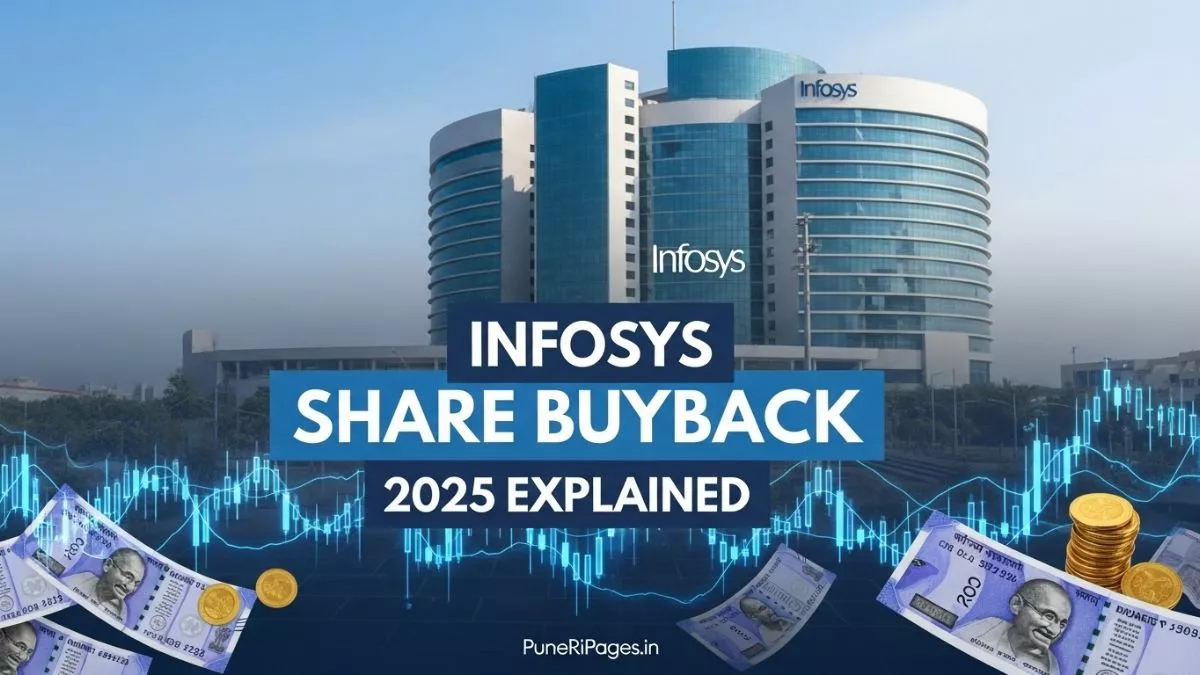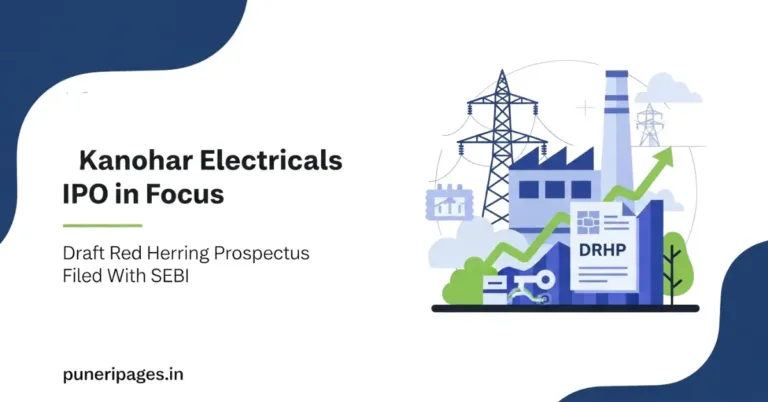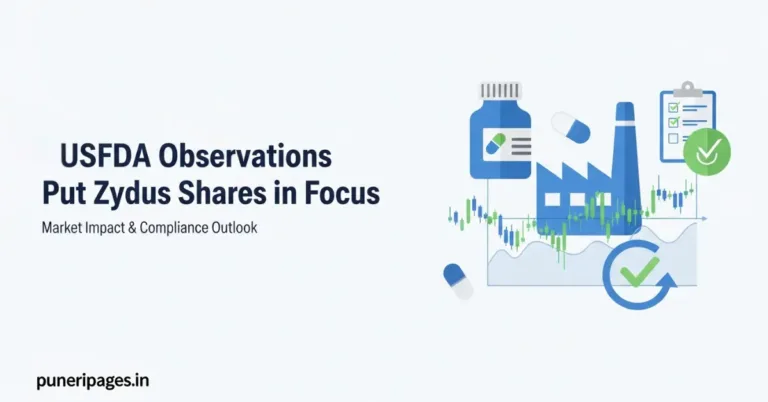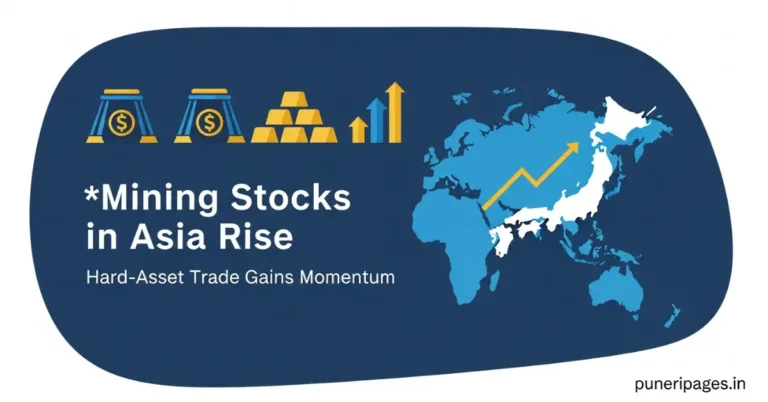
Infosys announces another major share buyback — here’s what it means for investors. Full story on PuneRiPages.in.
By Prashant for PuneriPages.in
The Infosys buyback 2025 has once again captured the attention of investors, analysts, and market enthusiasts. As one of India’s leading IT giants, Infosys has consistently rewarded its shareholders through buybacks and dividends, reflecting its strong cash flow and commitment to enhancing shareholder value. In this comprehensive guide, we’ll explore every detail — from the buyback size, record date, eligibility, price, and financial impact, to what investors should expect in the coming months.
Table of Contents
What Is the Infosys Buyback?
A share buyback (or repurchase) is a process where a company repurchases its own shares from existing shareholders, either from the open market or through a tender offer. The primary aim is to reduce the number of outstanding shares, thereby increasing earnings per share (EPS) and enhancing the company’s stock value.
Infosys, known for its strong balance sheet and consistent profitability, has conducted several buybacks in the past. The 2025 buyback continues this trend and signifies the company’s ongoing strategy to return excess cash to shareholders.
Infosys Buyback 2025 Highlights
- Company Name: Infosys Limited
- Type of Buyback: Tender Offer
- Buyback Size: ₹9,300 crore (approximate estimate)
- Buyback Price: ₹1,850 per share (expected)
- Record Date: Yet to be officially announced
- Mode: Tender Offer (shareholders can tender shares at the buyback price)
- Purpose: To enhance shareholder value and optimize capital structure
This buyback is expected to be one of the most significant corporate actions of the year, especially considering the strong financial performance Infosys has delivered over recent quarters.
Historical Context: Infosys’ Previous Buybacks
Infosys has a consistent history of buybacks that reflect its commitment to shareholders.
| Year | Buyback Amount (₹ Crore) | Buyback Price (₹) | Mode |
|---|---|---|---|
| 2017 | 13,000 | 1,150 | Tender Offer |
| 2019 | 8,260 | 800 | Open Market |
| 2021 | 9,200 | 1,750 | Open Market |
| 2022 | 9,300 | 1,850 | Open Market |
Each of these buybacks reflected Infosys’ robust liquidity position, strong free cash flow generation, and the company’s confidence in long-term growth.
Objective Behind the Infosys Buyback 2025
Infosys’ buyback strategy serves multiple financial and strategic purposes:
- Enhancing EPS (Earnings Per Share):
By reducing the total number of outstanding shares, the company boosts its EPS, making the stock more attractive to investors. - Optimizing Capital Allocation:
Infosys maintains a healthy balance between reinvestment in R&D, acquisitions, and returning capital to shareholders. - Boosting Investor Confidence:
Buybacks signal management’s confidence in the company’s future, strengthening investor trust. - Maintaining Healthy Cash Levels:
Infosys’ consistent generation of free cash flow allows it to deploy excess funds productively. - Tax-Efficient Return to Shareholders:
Compared to dividends, buybacks can be more tax-efficient for investors, depending on prevailing tax rules.
How Does the Infosys Buyback Work?
Tender Offer Process
The Infosys buyback 2025 is expected to take place via the tender offer route, meaning eligible shareholders can tender some or all of their shares at a predetermined price.
Here’s how it works step-by-step:
- Announcement: Infosys officially announces the buyback with all details.
- Record Date: Shareholders on record by this date become eligible to participate.
- Tender Period: Eligible shareholders can offer their shares through brokers during the buyback window.
- Acceptance Ratio: Depending on demand, Infosys will accept shares proportionally (especially for small shareholders).
- Payment: After the buyback closes, accepted shareholders receive payment directly in their bank account, and shares are extinguished.
Who Is Eligible for the Infosys Buyback?
Only those holding Infosys shares as of the record date can participate in the buyback.
The record date will determine eligibility for both retail investors (holding shares worth ≤ ₹2 lakh) and institutional investors (holding shares worth > ₹2 lakh).
Retail investors typically enjoy a higher acceptance ratio, as SEBI mandates a specific reservation for small shareholders.
Expected Benefits to Shareholders
The Infosys buyback is expected to benefit shareholders in several ways:
- Improved Earnings Per Share (EPS) due to reduced outstanding shares.
- Potential stock price appreciation post-buyback due to increased demand and reduced supply.
- Assured premium over market price, providing short-term profit opportunities.
- Confidence in management, signaling that Infosys believes its stock is undervalued.
Market Reaction and Expert Views
Market analysts have shown strong optimism regarding Infosys’ buyback plans.
Experts believe that this move aligns perfectly with the company’s capital allocation strategy, especially amid global IT headwinds.
According to leading financial experts:
“Infosys’ buyback reinforces its financial stability and shareholder-friendly approach. The buyback premium provides investors a strong short-term gain, while long-term holders benefit from enhanced valuation metrics.”
Brokerages like HDFC Securities, ICICI Direct, and Motilal Oswal have noted that buybacks from Infosys often coincide with favorable market reactions, resulting in steady appreciation of share price in subsequent weeks.
Infosys Financial Performance and Cash Position
Infosys reported robust earnings in its latest financial results, with consistent revenue growth, margin expansion, and strong deal wins in key markets.
- Revenue (FY2025): ₹1,55,000 crore (approx.)
- Net Profit: ₹26,000 crore
- Free Cash Flow: ₹32,000 crore
- Cash and Investments: Over ₹45,000 crore
These strong fundamentals support the company’s ability to undertake buybacks without compromising on business expansion or innovation.
Impact on Stock Price
Historically, Infosys shares have shown positive momentum following buyback announcements.
- The buyback premium typically ranges between 15–25% above the prevailing market price.
- Post-buyback, Infosys’ share price often stabilizes at a higher level due to improved EPS and reduced equity base.
However, short-term volatility can occur during the buyback period due to arbitrage opportunities and market speculation.
Should Investors Participate in the Infosys Buyback 2025?
For retail investors, Infosys buybacks have traditionally been safe and profitable opportunities.
If the company offers a premium price (e.g., ₹1,850 per share), participation can yield short-term profits of 10–20%, depending on the acceptance ratio.
Long-term investors may choose to hold shares even after the buyback, as Infosys continues to demonstrate solid fundamentals, innovation in AI-driven services, and digital transformation projects globally.
Final Thoughts
The Infosys Buyback 2025 reaffirms the company’s commitment to rewarding shareholders while maintaining a strong growth trajectory. With consistent cash generation, prudent management, and a shareholder-first philosophy, Infosys continues to be one of India’s most trusted blue-chip IT companies.
Whether you are a retail investor seeking short-term gains or a long-term holder, this buyback stands as an opportunity worth analyzing carefully. As always, investors should consider their risk appetite and consult financial advisors before making participation decisions.



